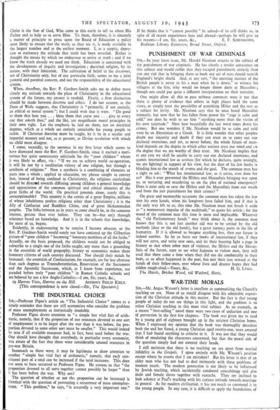THE INDUSTRIAL CHOICE
Six,—Professor Pigou's article on " The Industrial Choice " comes as a timely reminder that there are still economists who consider the problem of mass unemployment as intrinsically insoluble.
Professor Pigou draws attention to " a simple but vital fact of arith- metic, namely, that if the proportion of our resources devoted to one sort of employment is to be larger after the war than it was before, the pro- portion devoted to some other sort must be smaller." This would indeed be true if all available resources had, in fact, been used before the war. One should have thought that everybody, in particular every economist, was aware of the fact that there were considerable unused resources in pre-war Britain.
Inasmuch as there were, it may be legitimate to draw attention to another " simple but vital fact of arithmetic," namely, that each con- stituent part of a total can be increased if the total-increases. This does not seem to have occurred to Professor Pigou. He assures us that " the proportion devoted to all sorts together cannot possibly be larger " than it has been before the war. Why not?
The question of whether or not tht; proportion can be increased is identical with the question of preventing a recurrence of mass unemploy- ment. " This problem," he says, "is assuredly a very important one." If he thinks that it " cannot possibly " be solved—if he still thinks so, in spite of all recent experiences here and abroad—perhaps he will give us


























 Previous page
Previous page